Difference between revisions of "Search Intent"
(→Related links) |
|||
| (3 intermediate revisions by 2 users not shown) | |||
| Line 3: | Line 3: | ||
== What is search intent? == | == What is search intent? == | ||
| − | Search intent is the aim or purpose behind a user's search. In layman's terms, if a person searches for something on Google the search or user intent is the what and why of that search. | + | Search intent is the aim or purpose behind a user's search. In layman's terms, if a person searches for something on Google the search or user intent is the "what" and "why" of that search. |
== Common types of search intent == | == Common types of search intent == | ||
| Line 13: | Line 13: | ||
=== Informational intent === | === Informational intent === | ||
| − | Information intent is the root of Google in itself. It is people searching for information about a specific topic. This could be about animals, recipes, quantum mechanics, or anything in between. With informational searches people wish to learn more about a topic - sometimes in-depth sometimes just short bites of information. | + | Information intent is the root of Google in itself. It is people searching for information about a specific topic. This could be about animals, recipes, quantum mechanics, or anything in between. With informational searches people wish to learn more about a topic - sometimes in-depth, sometimes just short bites of information. |
Over the years Google has also been able to determine the specific aim with informational keywords. For example, if you search for “pancakes” it will give you a recipe, instead of where you can buy pancakes. If you search for “earth” it understands you’ll want to know more about the planet, than soil. | Over the years Google has also been able to determine the specific aim with informational keywords. For example, if you search for “pancakes” it will give you a recipe, instead of where you can buy pancakes. If you search for “earth” it understands you’ll want to know more about the planet, than soil. | ||
| Line 29: | Line 29: | ||
=== Transactional intent === | === Transactional intent === | ||
| − | Transactional intent is the most straightforward to understand and determine. Those with a transactional intent aim to purchase a product and are likely to have their card ready to go. For example, if someone searches for “buy iPhone” on Google you’ll know that they’ll be buying the latest iPhone. From a business perspective, transactional intent keywords have the most value to them and can make the most sense to target depending on keyword difficulty. | + | Transactional intent is the most straightforward to understand and determine. Those with a transactional intent aim to purchase a product and are likely to have their card ready to go. For example, if someone searches for “buy iPhone” on Google you’ll know that they’ll be buying the latest iPhone. From a business perspective, transactional intent keywords have the most value to them and can make the most sense to target depending on [[Keyword Difficulty|keyword difficulty]]. |
[[File:Transactional-query-example.png|link=|border|alt=Transactional Search Intent|Screenshot showing google results for "buy iPhone" as an example for transactional search intent]] | [[File:Transactional-query-example.png|link=|border|alt=Transactional Search Intent|Screenshot showing google results for "buy iPhone" as an example for transactional search intent]] | ||
| Line 37: | Line 37: | ||
=== Commercial intent === | === Commercial intent === | ||
| − | Commercial | + | Commercial intent is very similar to transactional intent but it’s an early process in the sales cycle. With commercial intent, users are looking to buy, however, they need more information about the topic. As with the above example, you’ll know if someone types “best iPhone” in Google then they are interested in buying an iPhone but aren’t sure which one will be the right one for them. A lot of [[Affiliate Marketing|affiliate]] websites make their money by targeting commercial keywords. |
[[File:Commercial-query-example.png|link=|border|alt=Commercial Search Intent|Screenshot showing google results for "best iPhone" as an example for commercial search intent]] | [[File:Commercial-query-example.png|link=|border|alt=Commercial Search Intent|Screenshot showing google results for "best iPhone" as an example for commercial search intent]] | ||
| Line 45: | Line 45: | ||
== Why is search intent important? == | == Why is search intent important? == | ||
| − | Search | + | Search intent is a central concept for search engine optimization. |
| − | The more information you have about the search intent the better you can optimize your content for it. For example, if a search term is informational then you know that you’ll need to create content that’s detailed and answers the query exactly. However, if it’s a commercial intent you're better off creating a dedicated landing page to please Google. | + | The more information you have about the search intent associated with a specific keyword, the better you can optimize your content for it. For example, if a search term is informational then you know that you’ll need to create content that’s detailed and answers the query exactly. However, if it’s a commercial intent you're better off creating a dedicated landing page to please Google. |
Secondly, and somewhat more importantly, considering search intent while doing <html><a href="https://www.seobility.net/en/keyword-research-tool/" target="_blank">keyword research</a></html> is crucial. Not only is it important that a keyword has volume and a difficulty level that’s suitable for you, but it should also have the right intent. For example, it could be better to optimize your content for a keyword that has a lower search volume but commercial intent, than a keyword with high volume but informational intent. | Secondly, and somewhat more importantly, considering search intent while doing <html><a href="https://www.seobility.net/en/keyword-research-tool/" target="_blank">keyword research</a></html> is crucial. Not only is it important that a keyword has volume and a difficulty level that’s suitable for you, but it should also have the right intent. For example, it could be better to optimize your content for a keyword that has a lower search volume but commercial intent, than a keyword with high volume but informational intent. | ||
| Line 53: | Line 53: | ||
== How to determine search intent? == | == How to determine search intent? == | ||
| − | Once you know the types of search | + | Once you know the types of search intent, it’s essential that you’re able to determine which type a specific search is. <html><a href="https://www.seobility.net/en/keyword-research-tool/" target="_blank">Seobility’s free Keyword Research Tool</a></html> will help you do this for any keyword. Just type in your keyword and on the results page you’ll find a column called “S.I.” that shows the main search intent(s) for each keyword: |
| + | |||
| + | [[File:Natural-cosmetics.png|link=|border|650px|alt=search intent information in the keyword research tool|Screenshot of the Seobility Keyword Research Tool]] | ||
| + | |||
| + | As a next step, it makes sense to search for the keyword on Google and take a close look at what kind of content is showing up in the top positions. This will allow you to optimize your content even more granularly to what users are searching for (e.g. in terms of content format, angle, etc.) | ||
== How to optimize for search intent == | == How to optimize for search intent == | ||
| Line 61: | Line 65: | ||
With the former, you need to ensure that the [[Meta Title|title]] and <html><a href="https://www.seobility.net/en/blog/meta-descriptions/" target="_blank">meta description</a></html> of your content meet the intent, and of course, lead towards a click through. | With the former, you need to ensure that the [[Meta Title|title]] and <html><a href="https://www.seobility.net/en/blog/meta-descriptions/" target="_blank">meta description</a></html> of your content meet the intent, and of course, lead towards a click through. | ||
| − | With the latter, you need to ensure that once you do have your user on the page then there are clear signs for them to navigate your site to get everything they need. This is especially important for commercial and transactional intent. | + | With the latter, you need to ensure that once you do have your user on the page then there are clear signs that this is exactly what they have been looking for. It should also be easy for them to navigate your site to get everything they need. This is especially important for commercial and transactional intent. |
== Importance for SEO == | == Importance for SEO == | ||
| Line 69: | Line 73: | ||
==Related links == | ==Related links == | ||
| − | * <html><a href="https://www.seobility.net/en/blog/search-intent-optimization/" target="_blank">Search Intent: How to optimize your content for searchers’ needs - Seobility blog</a></html> | + | * <html><a href="https://www.seobility.net/en/blog/search-intent-optimization/" target="_blank">Search Intent: How to optimize your content for searchers’ needs - Seobility Blog</a></html> |
| + | * <html><a href="https://www.seobility.net/en/blog/how-to-do-keyword-research/" target="_blank">Keyword Research and Analysis: How To Find The Best Keywords For Your Website - Seobility Blog</a></html> | ||
== Similar articles == | == Similar articles == | ||
| Line 87: | Line 92: | ||
} | } | ||
</script></html> | </script></html> | ||
| + | |||
| + | {| class="wikitable" style="text-align:left" | ||
| + | |- | ||
| + | |'''About the author''' | ||
| + | |- | ||
| + | | [[File:Seobility S.jpg|link=|100px|left|alt=Seobility S]] The Seobility Wiki team consists of seasoned SEOs, digital marketing professionals, and business experts with combined hands-on experience in SEO, online marketing and web development. All our articles went through a multi-level editorial process to provide you with the best possible quality and truly helpful information. Learn more about <html><a href="https://www.seobility.net/en/wiki/Seobility_Wiki_Team" target="_blank">the people behind the Seobility Wiki</a></html>. | ||
| + | |} | ||
| + | |||
| + | <html><script type="application/ld+json"> | ||
| + | { | ||
| + | "@context": "https://schema.org", | ||
| + | "@type": "Article", | ||
| + | "author": { | ||
| + | "@type": "Organization", | ||
| + | "name": "Seobility", | ||
| + | "url": "https://www.seobility.net/" | ||
| + | } | ||
| + | } | ||
| + | </script></html> | ||
Latest revision as of 10:21, 11 January 2024
Contents
What is search intent?
Search intent is the aim or purpose behind a user's search. In layman's terms, if a person searches for something on Google the search or user intent is the "what" and "why" of that search.
Common types of search intent
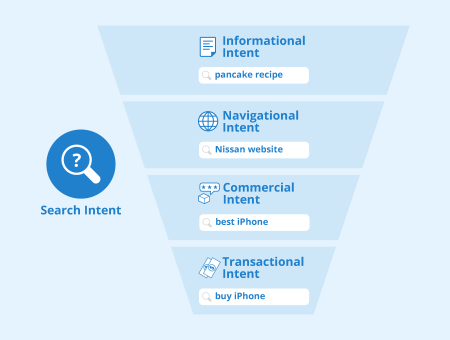
There are currently four main types of search intent. In many cases, intent can overlap, but you’ll always be able to identify the primary and secondary intents accordingly.
Informational intent
Information intent is the root of Google in itself. It is people searching for information about a specific topic. This could be about animals, recipes, quantum mechanics, or anything in between. With informational searches people wish to learn more about a topic - sometimes in-depth, sometimes just short bites of information.
Over the years Google has also been able to determine the specific aim with informational keywords. For example, if you search for “pancakes” it will give you a recipe, instead of where you can buy pancakes. If you search for “earth” it understands you’ll want to know more about the planet, than soil.
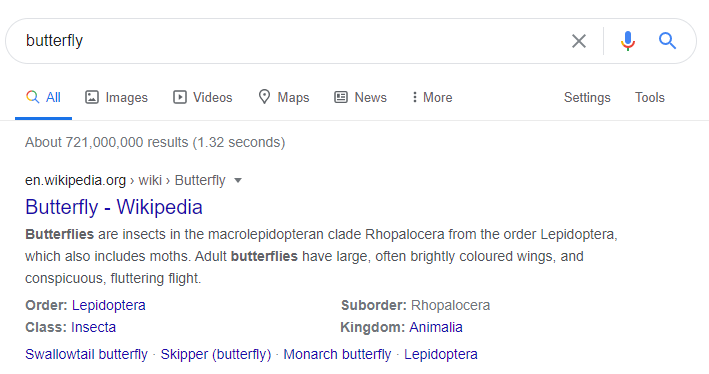
Example of an informational search query on google.com
Navigation intent is about a person wanting to get to a specific site. This is often done if people know the name of a product but don’t know the website. For example “Nissan” has a high search volume because Nissan.com isn’t the official car website, so many people Google Nissan to find the right one.
Another common example is that when people install Windows their first search will be for “Chrome” and Google automatically knows their aim is to download Chrome.
Transactional intent
Transactional intent is the most straightforward to understand and determine. Those with a transactional intent aim to purchase a product and are likely to have their card ready to go. For example, if someone searches for “buy iPhone” on Google you’ll know that they’ll be buying the latest iPhone. From a business perspective, transactional intent keywords have the most value to them and can make the most sense to target depending on keyword difficulty.
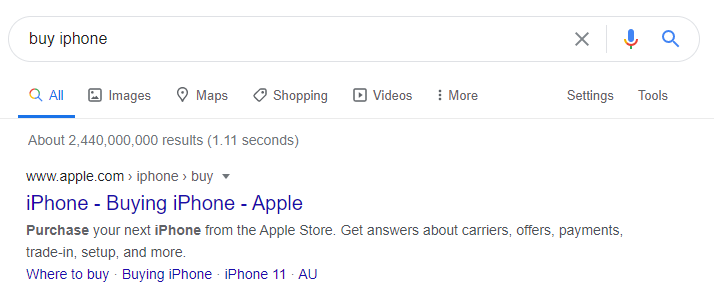
Example of a transactional search query on google.com
Commercial intent
Commercial intent is very similar to transactional intent but it’s an early process in the sales cycle. With commercial intent, users are looking to buy, however, they need more information about the topic. As with the above example, you’ll know if someone types “best iPhone” in Google then they are interested in buying an iPhone but aren’t sure which one will be the right one for them. A lot of affiliate websites make their money by targeting commercial keywords.
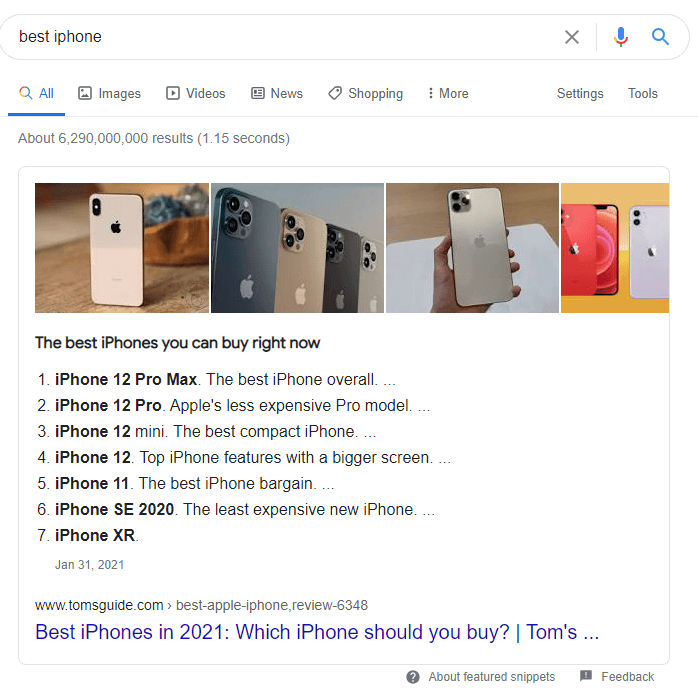
Example of a commercial search query on google.com
Why is search intent important?
Search intent is a central concept for search engine optimization.
The more information you have about the search intent associated with a specific keyword, the better you can optimize your content for it. For example, if a search term is informational then you know that you’ll need to create content that’s detailed and answers the query exactly. However, if it’s a commercial intent you're better off creating a dedicated landing page to please Google.
Secondly, and somewhat more importantly, considering search intent while doing keyword research is crucial. Not only is it important that a keyword has volume and a difficulty level that’s suitable for you, but it should also have the right intent. For example, it could be better to optimize your content for a keyword that has a lower search volume but commercial intent, than a keyword with high volume but informational intent.
How to determine search intent?
Once you know the types of search intent, it’s essential that you’re able to determine which type a specific search is. Seobility’s free Keyword Research Tool will help you do this for any keyword. Just type in your keyword and on the results page you’ll find a column called “S.I.” that shows the main search intent(s) for each keyword:
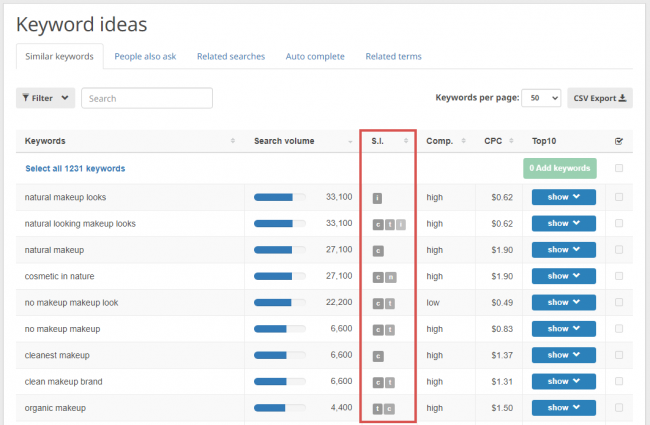
As a next step, it makes sense to search for the keyword on Google and take a close look at what kind of content is showing up in the top positions. This will allow you to optimize your content even more granularly to what users are searching for (e.g. in terms of content format, angle, etc.)
How to optimize for search intent
Different intents require different optimization strategies. However, the two main factors that you need to consider are the SERPs and the actionability.
With the former, you need to ensure that the title and meta description of your content meet the intent, and of course, lead towards a click through.
With the latter, you need to ensure that once you do have your user on the page then there are clear signs that this is exactly what they have been looking for. It should also be easy for them to navigate your site to get everything they need. This is especially important for commercial and transactional intent.
Importance for SEO
Understanding and meeting search intent is crucial for a good SEO strategy. Not only will it help to target keywords better but it will also help to drive more traffic from those keywords.
Related links
- Search Intent: How to optimize your content for searchers’ needs - Seobility Blog
- Keyword Research and Analysis: How To Find The Best Keywords For Your Website - Seobility Blog
Similar articles
| About the author |
 |